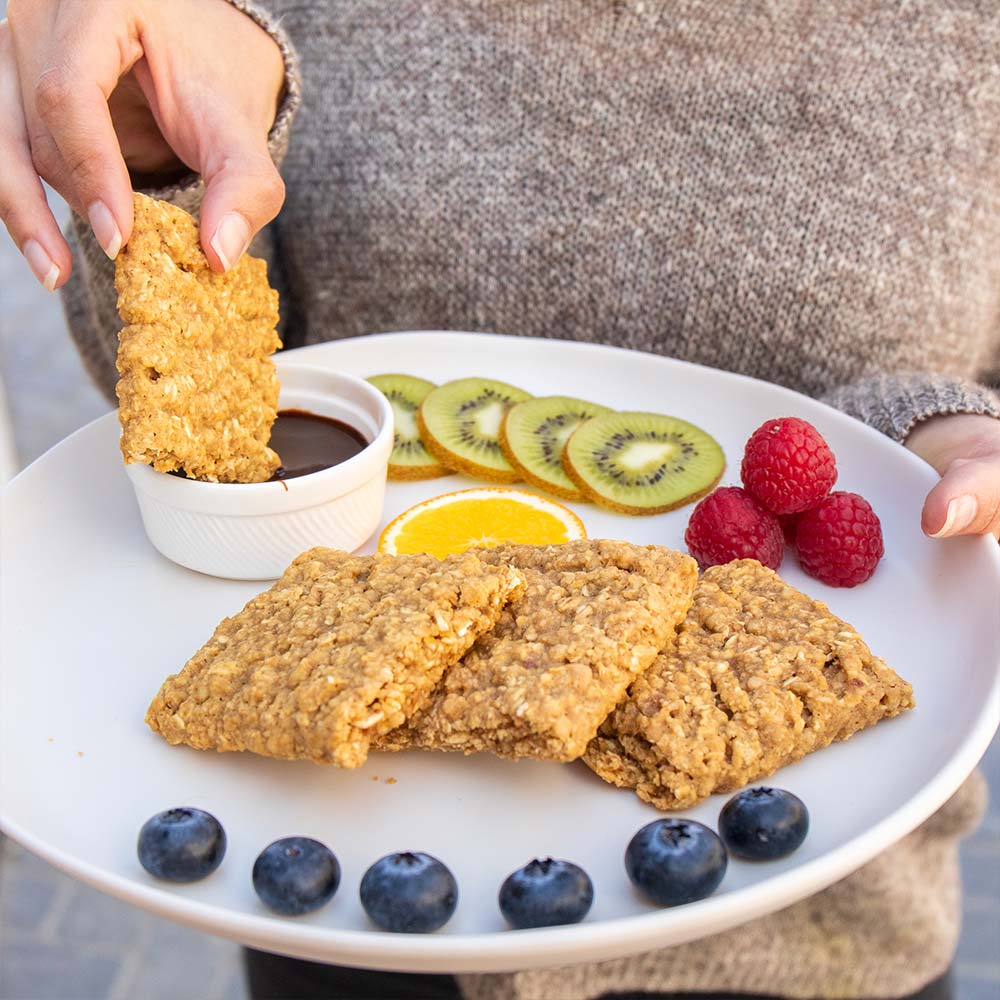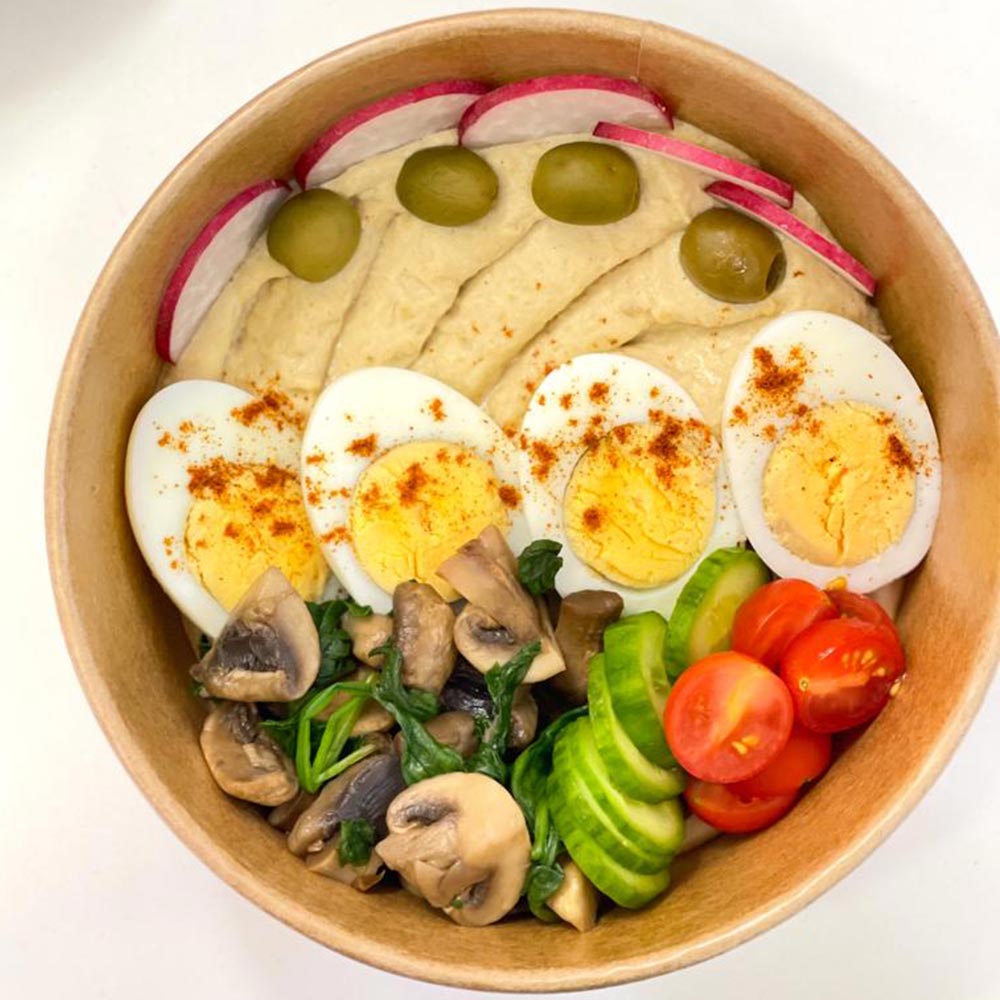Are you looking for a way to build muscle without relying on animal products? Do you want to learn how to create your own customized muscle gain diet plan with plant-based protein? If so, you are not alone. Many people are interested in the benefits of a plant-based diet for health, ethics, and environmental reasons. However, they may also have some concerns about getting enough protein, calories, and nutrients to support their muscle growth and performance. In this article, we will show you how to overcome these challenges and design a plant-based diet plan that meets your specific needs and goals. You will discover the best sources of plant-based protein, how to calculate your calorie and protein requirements, how to plan and prepare your meals and snacks, and how to monitor your progress and results.

Benefits of a Plant-Based Protein Muscle Gain Diet
Switching to a plant-based protein diet can have numerous
benefits for those looking to gain muscle. Here are some advantages to
consider:
1. Improved nutrient intake and overall health
A plant-based protein diet is rich in essential nutrients,
vitamins, and minerals that can support overall health. By incorporating a
variety of plant-based protein sources, you can ensure that your body receives
a wide range of nutrients necessary for muscle growth and recovery.
2. Reduction in saturated fats and cholesterol
Animal-based protein sources often contain high levels of saturated fats and cholesterol, which can negatively impact cardiovascular health. By adopting a plant-based protein diet, you can significantly reduce your intake of these harmful substances, promoting better heart health and overall well-being.

Understanding Your Macronutrient Needs for Muscle Gain
When it comes to building muscle, consuming the right
macronutrients is essential for optimal growth and recovery. While protein is
often the focus of muscle gain diets, it is important to also pay attention to
your carbohydrate and fat intake.
Importance of Consuming Adequate Protein for Muscle Growth
Protein is the main building block of muscle tissue and
plays a crucial role in muscle repair and growth. It is recommended to consume
around 1.2 to 2 grams of protein per kilogram of body weight per day for muscle
gain. This can be achieved through incorporating protein-rich plant-based foods
into your diet.
Balancing Carbohydrate and Fat Intake for Energy and Muscle Recovery
Carbohydrates are the body's primary source of energy and
play a key role in fueling your workouts and replenishing glycogen stores. It
is recommended to consume complex carbohydrates, such as whole grains, fruits,
and vegetables, to provide sustained energy for muscle building. Additionally,
healthy fats, such as those found in nuts, seeds, and avocados, are important
for hormonal balance and supporting overall health.
By finding the right balance of protein, carbohydrates, and fats in your muscle gain diet, you can ensure proper nutrient intake for muscle growth and recovery.

Choosing the Right Plant-Based Protein Sources
When following a plant-based protein muscle gain diet, it is
crucial to choose the right sources of protein. Fortunately, there are numerous
plant-based options to meet your protein needs. Here are some factors to
consider:
Variety of Plant-Based Protein Sources
One advantage of a plant-based diet is the wide variety of
protein sources available. Legumes, such as chickpeas, lentils, and beans, are
excellent choices as they are rich in protein and also provide fiber. Other
plant-based protein sources include tofu, tempeh, seitan, and edamame.
Vegan protein powders derived from sources like peas, brown
rice, and hemp are also popular options. They are convenient and can be easily
incorporated into smoothies or recipes. Additionally, nuts, seeds, and quinoa
are protein-rich plant foods that can be added to salads, stir-fries, or eaten
as snacks.
Consideration of Amino Acid Profiles in Plant-Based Proteins
While plant-based proteins offer several benefits, it is
important to consider the amino acid profile of the protein sources. Some plant
proteins may be lacking in certain essential amino acids. To overcome this, it
is recommended to consume a wide variety of plant-based protein sources to
ensure that all essential amino acids are being met.
Combining different protein sources, such as legumes with
grains or nuts with seeds, can help create a more balanced amino acid profile.
Additionally, consuming a variety of plant-based protein sources ensures a
diverse nutrient intake.
It may also be beneficial to consult with a registered dietitian or nutritionist to ensure you are meeting your protein needs and getting a balanced amino acid intake on your plant-based muscle gain diet.

Designing Your Meal Plan with Plant-Based Protein
When creating a meal plan for muscle gain with plant-based
protein, it's important to calculate your protein requirements and spread your
intake throughout the day. This ensures that your body has a consistent supply
of amino acids for muscle growth.
Start by determining your daily protein needs. The general
recommendation for individuals looking to build muscle is to consume about
1.2-2.0 grams of protein per kilogram of body weight. However, this may vary
depending on factors such as age, gender, activity level, and overall goals.
Next, incorporate a mix of protein-rich foods into your
meals and snacks. Plant-based protein sources can include legumes (such as
lentils, chickpeas, and beans), tofu and tempeh, seitan, edamame, quinoa, chia
seeds, hemp seeds, and nutritional yeast.
Here's an example of a plant-based protein meal plan:
Breakfast:
Tofu scramble with mixed vegetables and nutritional yeast
Whole grain toast with almond butter
Green smoothie with spinach, banana, almond milk, and chia
seeds
Snack:
Handful of mixed nuts and seeds
Protein-packed energy bar
Lunch:
Chickpea salad with mixed greens, cherry tomatoes, cucumber,
and lemon-tahini dressing
Quinoa and vegetable stir-fry with tofu or tempeh
Snack:
Carrot sticks with hummus
Protein smoothie with almond milk, banana, and hemp seeds
Dinner:
Lentil curry with brown rice
Grilled vegetables with quinoa
Snack:
Plant-based yogurt with berries
Peanut butter and banana on rice cakes
Remember to drink plenty of water throughout the day and listen to your body's hunger and fullness cues. Feel free to modify this meal plan based on your preferences and dietary restrictions.

Pre- and Post-Workout Nutrition for Muscle Recovery
Proper nutrition before and after workouts is crucial for
muscle recovery and growth. Here are some key considerations:
1. Importance of Consuming Protein and Carbohydrates
Before a workout, it's recommended to consume a combination
of protein and carbohydrates. Protein helps to repair and rebuild muscle
tissues, while carbohydrates provide energy for the workout. Aim for a snack or
small meal containing both protein and carbohydrates about 1-2 hours before
your workout.
After a workout, your muscles need nutrients to recover and
grow. Consuming a mix of protein and carbohydrates within 30-60 minutes after
exercise is ideal. This supports muscle protein synthesis and replenishes
glycogen stores.
2. Timing and Portion Sizes
The timing of your pre- and post-workout meals/snacks is
crucial. Aim to have your pre-workout snack or meal at least an hour before
exercising to allow for digestion. After your workout, try to consume your
post-workout meal or snack as soon as possible to maximize nutrient absorption.
The portion sizes of your pre- and post-workout meals will
depend on factors such as body weight, intensity of exercise, and individual
needs. It's recommended to include approximately 20-30 grams of protein and
30-60 grams of carbohydrates in each of these meals.
3. Protein Sources
When it comes to protein sources, plant-based options are
plentiful and can provide all the essential amino acids your body needs for
muscle recovery. Some excellent plant-based protein sources include legumes
(such as lentils, chickpeas, and black beans), tofu, tempeh, seitan, edamame,
and quinoa.
In addition to these whole foods, you can also consider
incorporating plant-based protein powders or shakes into your pre- and
post-workout routine. Just make sure to choose high-quality, plant-based
protein powders that have been tested for purity and effectiveness.
4. Hydration
Remember that hydration is also a vital aspect of pre- and
post-workout nutrition. Proper hydration supports optimal muscle function and
recovery. Make sure to drink water before, during, and after your workout to
stay hydrated.
By prioritizing your pre- and post-workout nutrition and incorporating plant-based protein sources into your diet, you can optimize muscle recovery and support your muscle gain goals.

Incorporating Supplements into Your Muscle Gain Diet
When it comes to optimizing your muscle gain diet,
supplements can play a valuable role in supporting your goals. However, it's important
to choose high-quality and tested supplements to ensure safety and
effectiveness. Here are some key points to consider:
Understanding the Role of Supplements
Supplements are not necessary for everyone, but they can be
beneficial for individuals who may struggle to meet their nutrient needs solely
through diet. They can help bridge the nutritional gaps and support muscle
growth.
Choosing High-Quality Supplements
When selecting supplements, look for trusted brands that
prioritize quality and safety. Make sure they have been tested by third-party
organizations to verify their purity and potency.
Common Muscle Gain Supplements
There are various supplements available that can aid in
muscle gain. Some widely used ones include:
1. Whey protein powder: While it is derived from milk, there
are plant-based options available that can provide the necessary protein for
muscle growth.
2. Creatine: This supplement can enhance muscle strength and
power during workouts.
3. Branched-chain amino acids (BCAAs): BCAAs can help support
muscle recovery and reduce exercise-induced muscle damage.
4. Omega-3 fatty acids can help reduce inflammation and support overall health.

Consult with a Professional
It's always a good idea to consult with a registered
dietitian or healthcare professional before starting any new supplements. They
can provide personalized advice based on your specific needs and goals.
Remember, while supplements can be helpful, they should not
replace a balanced and nutrient-rich diet. Focus on getting most of your
nutrients from whole foods and use supplements as a complement to support your
muscle gain journey.
Tips for Meal Prepping on a Plant-Based Protein Diet
Meal prepping is a great strategy to ensure that you have
nutritious and protein-rich meals readily available throughout the week. Here
are some tips to help you with meal prepping on a plant-based protein diet:
1. Plan your meals
Take some time each week to plan out your meals. This will
help you stay organized and ensure that you have a variety of plant-based
protein sources in your diet.
2. Cook in batches
Cooking larger quantities of food at once will save you time
throughout the week. Prepare a big batch of plant-based protein sources like
lentils, beans, tofu, or tempeh, and store them in separate containers for easy
access.
3. Use versatile ingredients
Choose ingredients that can be used in multiple meals to add
variety to your diet. For example, roasted vegetables, quinoa, or brown rice
can be used as a base for different plant-based protein dishes.
4. Portion your meals
Divide your cooked meals into individual portions that you
can easily grab and reheat. This way, you can control your portion sizes and
ensure that you are meeting your protein requirements.
5. Invest in good storage containers
Invest in high-quality, airtight containers that are
suitable for storing your prepped meals. This will help keep your food fresh
for longer and prevent any spills or leaks.
6. Label your containers
Labeling your containers with the name of the dish and the
date it was prepped will help you keep track of the freshness of your meals.
Consume the oldest meals first to minimize food waste.
7. Freeze your meals
If you have prepared more meals than you can consume within
a few days, freeze them for later use. This way, you'll always have a backup
option when you are short on time.
8. Stay creative
Experiment with different recipes and flavors to keep your
meals interesting. This will prevent you from getting bored with your
plant-based protein diet and give you a chance to discover new favorite dishes.
By following these tips, you can simplify your muscle gain journey with a plant-based protein diet and ensure that you stay on track with your nutrition goals.

Staying Consistent with Your Muscle Gain Diet
When it comes to achieving your muscle gain goals,
consistency is key. Here are some tips to help you stay on track with your
plant-based protein diet:
Setting Realistic Goals and Expectations
It's important to have realistic expectations and set
achievable goals for muscle gain. Understand that muscle growth takes time and
consistency. Set specific and measurable goals that are within reach.
Developing a Routine
Create a routine that incorporates your muscle gain diet
plan. Plan your meals and snacks, and make sure you have the
necessary ingredients on hand. Having a structured routine will make it easier
for you to stick to your diet.
Strategies to Stay Motivated and Disciplined
Stay motivated by finding accountability partners or joining a fitness community. Surround yourself with like-minded individuals who can support and encourage you. Additionally, celebrate your small victories along the way to stay motivated.

Tracking Your Progress
Keep track of your body measurements, strength gains, and
overall progress. This will help you stay motivated and see the results of your
hard work. Consider taking progress pictures or keeping a workout journal to
document your journey.
Making Adjustments to Your Diet Plan
Everyone is different, and what works for someone
else may not work for you. Pay attention to how your body responds to your
muscle gain diet plan and make necessary adjustments. This might include
increasing or decreasing your protein intake, adjusting your meal timings, or
experimenting with different plant-based protein sources.
Remember, staying consistent with your muscle gain diet is a long-term commitment. Stay determined, patient, and disciplined, and you will see the results you desire.

Tracking Progress and Making Adjustments to Your Diet Plan
It is crucial to regularly track your progress and make
necessary adjustments to your diet plan for optimal muscle gain. Here are some
key points to consider:
Importance of Tracking
Tracking your body measurements, strength gains, and overall
progress is essential in determining the effectiveness of your muscle gain
diet. By monitoring these factors, you can identify what is working well and
what needs improvement.
Body Measurements
Keep track of measurements such as weight, body fat
percentage, and muscle mass. By regularly measuring these indicators, you can
assess changes in your body composition and adjust your diet accordingly.
Strength Gains
Monitor your strength gains in the gym to understand how
your muscle gain diet is impacting your performance. By tracking your ability
to lift heavier weights or perform more repetitions, you can gauge your
progress and fine-tune your diet plan.
Overall Progress
Assess your overall progress by evaluating factors such as
energy levels, recovery time, and mood. These subjective measures can provide
insights into how well your muscle gain diet is supporting your overall
well-being.
Making Adjustments
Based on your tracking data, you may need to make
adjustments to your diet plan. It is essential to analyze your progress
objectively and consult with a nutritionist or dietitian if necessary.
Individual Needs and Results
Every individual is unique, and what works for one person
may not work for another. It is crucial to listen to your body and tailor your
diet plan to your specific needs and goals. Experiment with different
approaches and adjust accordingly based on your results.
Remember, muscle gain is a gradual process, and it is important to stay patient and persistent. Track your progress, make adjustments as needed, and stay committed to your personalized muscle gain diet plan.

Conclusion
Creating your own customized muscle gain diet plan with
plant-based protein can be a highly beneficial approach to achieving your
fitness goals. By incorporating plant-based protein sources into your meals and
snacks, you can improve your nutrient intake, reduce saturated fats and
cholesterol, and support muscle growth.
Understanding your macronutrient needs is key to designing
an effective muscle gain diet plan. Ensuring you consume an adequate amount of
protein, while also balancing your carbohydrate and fat intake, will provide
you with the energy and support necessary for muscle recovery.
Choosing the right plant-based protein sources is essential
for achieving optimal results. With a variety of options available, it's
important to consider the amino acid profiles in these sources to ensure you're
getting a complete range of essential amino acids.
Designing your meal plan with plant-based protein involves
calculating your protein requirements and spreading your intake throughout the
day. Incorporating a mix of protein-rich foods into your meals and snacks will
provide you with a well-rounded diet to support muscle growth.
Pre- and post-workout nutrition is crucial for muscle
recovery. Consuming protein and carbohydrates before and after workouts, in the
appropriate timing and portion sizes, will aid in muscle repair and growth.
Incorporating supplements into your muscle gain diet can
also support your journey. It's important to choose high-quality and tested
supplements to ensure their safety and effectiveness in promoting muscle
growth.
Meal prepping can be a game-changer when following a
plant-based protein diet. By preparing your meals in advance, you can ensure
convenience and adherence to your diet plan. Tips for batch cooking and storing
plant-based protein meals will help you stay on track.
Staying consistent with your muscle gain diet requires
setting realistic goals and expectations. Developing a routine and finding strategies
to stay motivated and disciplined will help you stay on track and achieve the
results you desire.
Tracking your progress is important to assess your muscle
gain journey. By measuring body measurements, strength gains, and overall
progress, you can make necessary adjustments to your diet plan based on your
individual needs and results.
Remember, creating a customized muscle gain diet plan with
plant-based protein is a process. With dedication, consistency, and the right
tools, you can achieve your fitness goals and build the muscle you desire.






























